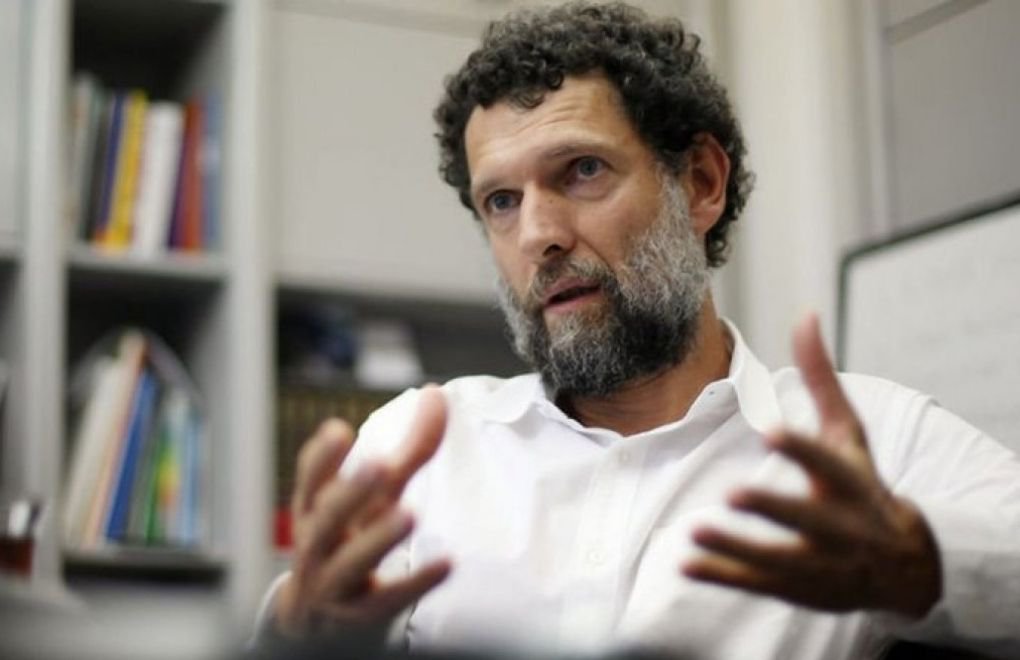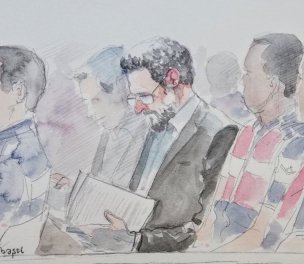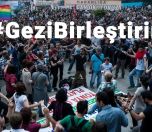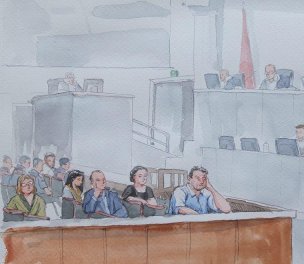Click to read the article in Turkish
Attorneys of imprisoned businessperson and rights advocate Osman Kavala released a statement yesterday (August 4) about the court's decision to merge two different cases concerning the 2013 Gezi Park protests.
In February 2020, nine defendants, including Kavala, were acquitted of an attempted overthrow of the government and other charges.
In January, an appeals court overturned the acquittals and ruled that the case of the çArşı supporter group, which was also related to the Gezi Park events, should be merged with the main trial.
The court ruled for the continuation of Kavala's arrest in the first hearing of the retrial on May 21.
Kavala's attorneys said the courts' actions during the process of merging were intended to keep Kavala in prison.
"With the start of the judicial recess, the chief judge of İstanbul 30th Heavy Penal Court was temporarily appointed to be chief judge of İstanbul 13th Heavy Penal Court," says the statement. "As the temporary chief judge of the 13th Heavy Penal Court, he proceeded to sign off on the response to the request to the 13th Heavy Penal Court he himself had written in his capacity as the chief judge of the 30th Heavy Penal, thereby giving consent to his own request to merge the cases!"
Full text of the statement:
Osman Kavala has been in detention for 1373 days. During this time, he has stood trial on three separate charges. The first two charges were related to allegedly being the organizer and financier of the Gezi protests (Turkish Penal Code article 312) and purportedly attempting to change the constitutional order (article 309) by supporting the July 15 coup attempt. Prior to Kavala being acquitted and released in the Gezi lawsuit, the European Court of Human Rights (ECtHR) had stated that there was "insufficient evidence" to support these two charges, found multiple violations of Kavala's rights, and demanded his immediate release. After the decision of the ECtHR and the Gezi trial acquittal, a third charge, this time concerning espionage (article 328), was brought against Kavala to justify continuing his detention, and he was detained on this charge. While Kavala was in detention on espionage charges, the Committee of Ministers of the Council of Europe, which monitors whether the decisions of the ECtHR are implemented or not, in all of its meetings to date issued decisions calling on the Turkish authorities to take steps to immediately release Kavala in line with the ECtHR decision. All kinds of extrajudicial means have been and are being implemented to unlawfully prolong the detention of Osman Kavala. After the indictment against him including the accusation of espionage was accepted by the 36th Heavy Penal Court and the trial proceeded to the verdict stage, a new development occurred. The regional court of appeal ruled to overturn the acquittal in the Gezi trial and to merge this case with the Çarşı case - which is also related to the Gezi events. As a result, Kavala's file concerning the espionage charge was sent to the İstanbul 30th Heavy Penal Court which had heard the Gezi case. İstanbul 30th Heavy Penal Court held only one hearing within seven months of the date of receiving the file, did not sign any conclusions, did not listen to any witnesses, did not even write a single warrant. İstanbul 30th Heavy Penal Court wrote to İstanbul 13th Heavy Penal Court - which is handling the "Çarşı-Gezi" file – asking for the court's consent to merge the cases, and expressing the opinion that they should be merged. İstanbul 13th Heavy Penal Court did not make a decision on the merging, scheduled a hearing for October 8, and decided to evaluate the merging issue after receiving a written statement by the defendant's lawyers. The 13th Heavy Penal Court did not give consent for the merging until the start of the judicial recess. With the start of the judicial recess, the chief judge of İstanbul 30th Heavy Penal Court was temporarily appointed to be chief judge of İstanbul 13th Heavy Penal Court. As the temporary chief judge of the 13th Heavy Penal Court, he proceeded to sign off on the response to the request to the 13th Heavy Penal Court he himself had written in his capacity as the chief judge of the 30th Heavy Penal, thereby giving consent to his own request to merge the cases! The 4th Judicial Package, which came into force while all these extrajudicial and irrational practices continued, included an article on "the requirement of 'concrete evidence' in the decisions of arrest and continuation of detention". In the trial conducted against Osman Kavala at İstanbul 30th Heavy Penal Court, the continuation of detention was ordered without providing any "concrete evidence" despite our insistent demands. Moreover, İstanbul 30th Heavy Penal Court canceled the hearing that was scheduled to be held on August 6, and as a result of the detention evaluation held on August 2, it decided to continue the detention of Osman Kavala, ignoring the requirement to cite "concrete evidence" mentioned in the 4th Judicial Package. We leave the interpretation of these illegal practices, which became familiar in the Kavala file and which have to be traced in the recent past, to the public opinion. We would like to reiterate to the public the essential point that unfortunately the violations of Osman Kavala's rights found by the ECtHR in its decision are continuing and the rules regarding detention are intentionally not being implemented. |
About Gezi trialThe Gezi trial began again on May 21, 2021 as the court of appeals overturned the verdicts of acquittal given by the local court. Arrested for over 1,200 days, businessperson and rights defender Osman Kavala and 15 other defendants appeared before the judge at the İstanbul 30th Heavy Penal Court in Çağlayan on charge of "attempting to overthrow the government." Here is a brief overview of the judicial process: Who is on trial?Osman Kavala, Mücella Yapıcı, Can Atalay, Tayfun Kahraman, Ali Hakan Altınay, Yiğit Aksakoğlu, Yiğit Ali Ekmekçi, Çiğdem Mater Utku and Mine Özerden, who were acquitted in the first trial; and Can Dündar, Mehmet Ali Alabora, Ayşe Pınar Alabora, Gökçe Tüylüoğlu, Handan Meltem Arıkan, Hanzade Hikmet Germiyanoğlu and İnanç Ekmekçi, whose files were separated, but have been merged again afterwards. Even though he was acquitted in the Gezi trial, Osman Kavala has been behind bars in Silivri Prison at the outskirts of İstanbul for over 1,200 days. Yiğit Aksakoğlu also served 220 days behind bars ias part of the Gezi trial. Who are the aggrieved parties?In the Gezi trial, where rights defenders were acquitted, the members of the 61st term cabinet, which was established in 2011, were referred to as the complainant aggrieved parties in the indictment. On the list of the aggrieved parties were the then PM Recep Tayyip Erdoğan, the then Deputy Prime Ministers Bülent Arınç, Ali Babacan, Beşir Atalay, Bekir Bozdağ, Emrullah İşler and the then Ministers Binali Yıldırım, Fatma Şahin, Egemen Bağış, Nihat Ergün, Faruk Çelik, Erdoğan Bayraktar, Ahmet Davutoğlu, Taner Yıldız, Suat Kılıç, Mehdi Eker, Hayati Yazıcı, Muammer Güler, Cevdet Yılmaz, Ömer Çelik, Mehmet Şimşek, Nabi Avcı, İsmet Yılmaz, Veysel Eroğlu, Mehmet Müezzinoğlu, Zafer Çağlayan and Sadullah Ergin. After founding the Future Party, Ahmet Davutoğlu announced that he withdrew from the files of criminal cases related to the crimes committed against him personally and were not of public nature, especially from the trials for insult, as an aggrieved party. DEVA Party Chair Ali Babacan also said, "I am not a complainant in the Gezi trial, nor am I an intervening party. Thinking that they were aggrieved, the prosecutor wrote the names of all members of the then government one by one. In our judicial system, there is no such thing as withdrawing from the position of an aggrieved party." What are the defendants charged with?In the first 657-page indictment, Gezi was defined as "a resurrection for coup". The defendants were accused of "organizing and funding the protests." They were charged with "attempting to overthrow the government", "damaging property", "damaging places of worship and cemeteries", "violating the Law on Firearms, Knives and Other Tools", "aggravated plunder" and "violating the Law on Protecting Cultural and Natural Assets." In reversing the acquittals, the court of appeals has also demanded that a criminal complaint be filed against the defendants on the grounds that they violated the Law no. 2911 on the Meetings and Demonstrations. According to the indictment, 16 defendants separately face 606 years to 2,970 years in prison on the offenses charges. What has happened till today?In July 2013, 26 people, including Mücella Yapıcı from the Chamber of Architects and Ali Çerkezoğlu from the İstanbul Medical Chamber, were detained. While they were released following their statements, the rights defenders faced a lawsuit for "founding and leading an organization" in March 2014. All defendants were acquitted in the ensuing trial heard by the İstanbul 33th Penal Court of First Instance on April 29, 2015. Afterwards, it was understood that prosecutor Muammer Akkaş was carrying out an investigation against the people who are currently on trial. Akkaş was also the person who gave the instruction to wiretap the rights defenders' phones. However, he was dismissed as part of an investigation into the December 17-25, 2014 operations and fled Turkey. İstanbul Public Prosecutor Yakup Ali Kahveci took over the file after Akkaş. The investigation, which also consisted of the evidence collected by Akkaş, was completed in 2019; the first hearing was held on June 24. Arrested pending trial, Yiğit Aksakoğlu was released at this hearing. A fews days after the second hearing, the Board of Judges and Prosecutors (HSK) changed the court board hearing the case. Accordingly, Galip Mert Perk was assigned as the Presiding Judge and Talip Ergen as a member of the court board. While the HSK did not change the place of duty of senior member Ahmet Tarık Çiftçioğlu, who had ruled in favor of the "continued arrest" of both Osman Kavala and Yiğit Aksakoğlu, the member of the court board who had expressed a dissenting opinion to the related ruling was assigned to another court. Examining the individual application of Osman Kavala, the European Court of Human Rights (ECtHR) pronounced its ruling of right violation on December 10, 2019 and ruled that Osman Kavala should be released immediately. At the final hearing on February 18, 2020, all defendants, except for the ones who were abroad, were acquitted of the offenses charged. Despite this acquittal and the ECtHR judgement, Osman Kavala was arrested again on another charge. Why are they on trial again?Following the acquittals in the Gezi trial, President and Justice and Development Party (AKP) Chair Recep Tayyip Erdoğan spoke at the group meeting of his party. Targeting Kavala, he said, "The person who stirred up Gezi was behind bars. They tried to acquit him with a maneuver." Shortly after this statement was made, the Board of Judges and Prosecutors (HSK) launched an inquiry against the three judges who were the members of the board of the İstanbul 30th Heavy Penal Court. The prosecutor's office also appealed against the verdicts of acquittal. Public Prosecutor Edip Şahiner demanded that the acquittals be reversed. The 3rd Penal Chamber of the İstanbul Regional Court of Justice, the court of appeals, reversed the rulings of acquittal handed down by the local court, the İstanbul 30th Heavy Penal Court, on January 22, 2021. Referring to the charges brought against the defendants in the indictment, the court justified its reversal by indicating that the pieces of evidence such as the defendants' social media posts, press statements and slogans chanted were not considered in handing down the ruling. |
(HA/VK)








